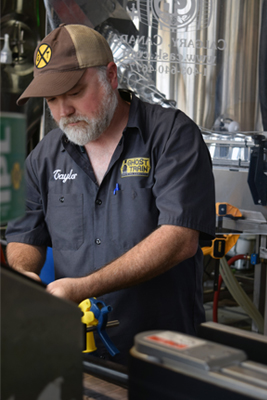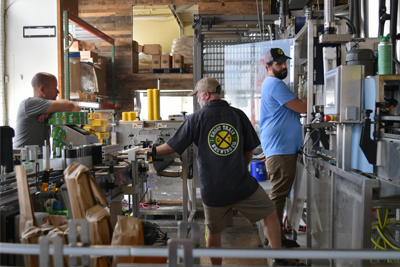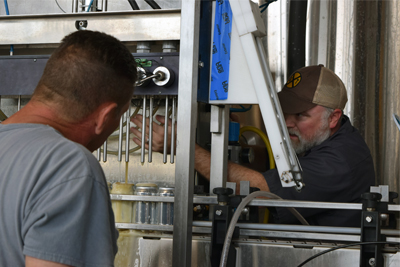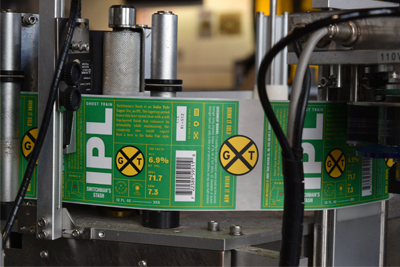One simple tour lit a spark in a young mind. But it wasn’t until college, that the spark ignited into something more.

“My mom took us to Golden, Colorado, to tour the big Coors facility,” said Taylor DeBoer, co-owner of Ghost Train Brewing Co. and a UAB alumni. “I was a junior in high school, but I remember thinking, ‘I would love to do something like this one day.’ It had a pretty big impact on me as a kid. I wouldn’t say it was a defining moment where I just knew that’s what I would do when I was older, but it was definitely always in the back of my mind.”
Fast forward a few years, and that idea became more front of mind for DeBoer.
After graduating from high school in Montgomery, DeBoer went to Auburn University where he majored in botany. It was there that his interest in brewing beer began.
“Craft beer hadn’t hit Alabama yet, so my friends and I would drive to Atlanta sometimes to get craft beer,” DeBoer said. “When I found out I could make my own, I was really excited. I had always been science minded so it wasn’t just brewing beer out of necessity, but really learning and understanding the science behind the process. I began experimenting with it and brewing all of the time. I wanted to perfect my process so I could get the quality product I wanted.”
His then girlfriend/now wife bought DeBoer his first home brewing kit from a flea market in Lee County. The first beer he brewed turned out horrible. Shortly after, his late aunt sent him a real home brewing kit for his birthday. DeBoer brewed the first batch and it turned out great. He was hooked after that.
While he was getting a degree in botany, DeBoer took multiple microbiology classes where he learned about yeast and the role yeast plays in brewing.
“Yeast is the organism that makes the magic of brewing happen,” he said. “They’re eating sugars, converting it to alcohol. Early on, I started cultivating my own yeast strains and banking them at my house and keeping yeast at my house. That overlap with my education was interesting.”
DeBoer graduated from Auburn, married his college sweetheart and moved to Birmingham for his wife’s job. Shortly after the move he was accepted into the MBA program at UAB. He had worked different laboratory jobs but knew early on that he wanted to use his science education in more of a business background versus working in a lab or in the field. He wanted different experiences. And he got them at UAB.
“From financial forecasting to sales and marketing, I definitely learned a lot of skills at UAB,” DeBoer said. “I had a lot of personal interaction with my instructors and was able to build good relationships with them. The only thing I wish was that I wasn’t in such a rush to get out of school. That’s the one thing I share with students today. People get so focused on the end goal of getting out that they don’t learn as much as they possibly can while they are there. You gain so many valuable tools, especially in the MBA program. If you’re going to be an entrepreneur you need sales and marketing, you need to be able to read a financial statement. You have to do more than one focused aspect of that business, at least in the beginning you do.”

DeBoer started an internship with a local printing company during his last year in the MBA program. While it was a great experience, it wasn’t a job he wanted to pursue after graduation. But he did find a great job as a marketing director for a local publishing company and he stayed with that company for 13 years.
“I was really the No. 2 guy in the company, and I worked right under the executive director,” DeBoer said. “I gained lots of experience and learned so much. We did a lot of business and grew trade shows from the ground up. It was a small company that I got to help grow into a large company.”
DeBoer was also one of the founding partners and owners of Cahaba Brewing Company. He sold his shares with Cahaba about a year later. While his venture with Cahaba wasn’t long-lived, it was the first time he had been involved in commercial brewing and he learned a lot from the experience.
“It was hard. I was working full-time at the publishing company and then heading to Cahaba to brew late at night,” he said. “I decided if I was ever going to do this again, I would do it full-time so I could give 100 percent attention and effort to it.”
But DeBoer couldn’t stay away from the brewing industry. He started Ghost Train Brewing Co in early 2016 and left his job with the publishing company April 1 that same year.
The name “Ghost Train” wasn’t just something that sounded cool. The name is really a nod to the city of Birmingham.
“My wife and I love the city and we kept seeing images of the old terminal station that was torn down in the late 70s. It was called the ‘Temple of Travel’ and it was a beautiful train station,” DeBoer said. “I was thinking about the fact that Birmingham’s port, as you would say, is the intersection of the railroad right through the middle of the city and the city was purposely built on that railroad. The name ‘Ghost Train’ came while we were thinking about the days gone by and what that old terminal station must have been like.”

Ghost Train started small with business mainly taking place in DeBoer’s home. They would order their recipes, drive over to Mississippi, brew the beer and then had it packaged and sent to their local distributors. This was the way of business for about 7 months and then, in October 2016, the brewery’s current downtown location officially opened.
“I never imagined it would turn into this big venture,” DeBoer said. “It was just a small thing, but then we got a location and I brought on a business partner – Patrick Small – who has been instrumental in the success of the business. I get to handle the beer and production of the beer and he handles sales and marketing. Having that partnership and the synergy we have has allowed this business to just explode.”
Ghost Train Brewing Company is open 7 days a week and has a staff of about 18. In addition to the tap room where people can come and drink beer, Ghost Train also distributes to Jefferson and Shelby counties.
DeBoer attributes the company’s success to his employees’ hard work.
“We try to empower our employees to make decisions, to not be afraid to make decisions,” he said. “We do a lot of collaboration where people that work here get to come up with their own ideas. If they sound good, we’ll try them on a big scale. Our tap room manager does a lot of the small batch beers and, if successful, we’ll take it to full-scale production.”
The sour beers are a new complicated style of brewing that DeBoer was not used to during his home brewing year. Ghost Train has developed its own sour system where everything is soured in totes and then rebrewed. In addition to yeast, they now deal with bacteria. It’s the same bacteria that is the base of yogurt, DeBoer added. But it’s what the customers want.
“We look at what’s going on in the market to see what’s on the horizon and what’s popular in other places, and these fruity, sour beers are it right now,” he said. “People thought it was just going to be a quick trend, but it seems to be a holding trend that we’ve become real popular for.”

That is where DeBoer’s business background has definitely come in to play. It has helped “make the crystal ball a bit clearer when we’re trying to anticipate what trends are coming next,” he added.
But this job is not without its challenges. One of DeBoer’s biggest struggles is ensuring the brewing schedules meet production demands. Brewing is a rapidly growing business, but at the end of the day it is dealing with live organisms. Questions like “How is the beer in the tank doing?” and “Is it going to come out today so we can fill it back up?” are common for DeBoer and his employees.
Another challenge is expansion. DeBoer would very much like to expand into new markets, but that requires space. They have expanded four times in their current location, and space is getting tight. As business grows, DeBoer said they hope to continue those expansion efforts.
But the people and relationships make all of the challenges seem minimal.
“Our customers take ownership in this place and they love to see what’s coming out next. They feel like they’re part of the business and it is fun to sit down and get to know them,” DeBoer said. “No matter what challenges we face or how frustrating the day might have been, there’s always beer at the end of the day.”